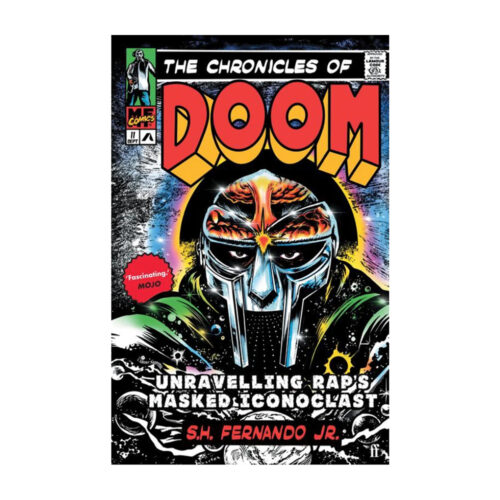The rapper with the paunch and thinning hair? No — the rapper with the mask. MF DOOM was a master of concealment. His iconic gimmick, the mask, was wielded by the late MC with the precision of an ’80s WWF wrestler — and with the same consequence: almost nothing is known about Daniel Dumile, the man behind it. True to his self-styled supervillain persona, MF DOOM operated from the shadows.
Privacy was sacred to him; Twitter and MTV Cribs were of no concern. Instead, he built his own mythology in a nerdy cut-up frenzy — part supervillain, part B-movie monster, part ghetto superstar. He quickly became an icon of the indie rap scene, admired by fans including Thom Yorke and Jonah Hill. A new book now sheds light on the DOOMian myth: MF DOOM – Chronicles of a Hip-Hop Icon by S. H. Fernando Jr..
Iconography of the Invisible
MF DOOM – Chronicles of a Hip-Hop Icon reads as a fragmented biography. Structured in five thematic chapters, it presents the story of the masked villain-rapper as a dazzling kaleidoscope of opportunity and self-determination, suffering and vice, hardship and nerdery, hustle and flow. From his birthplace in London to his childhood in Long Beach, New York, from his early career with KMD to his masked comeback in the late ’90s, the narrative leads all the way to the UK — to the place of his unintended exile, where he died in 2020.
Fernando Jr. spoke with Dumile’s friends, collaborators and family members, gathering everything traceable about him. His contextualisation of these fragments necessarily remains elusive — in true DOOM fashion. Yet he succeeds in painting a coherent portrait of both the artist and the man, Daniel Dumile. Despite an occasionally exuberant tone, the person behind the mask emerges vividly: a meticulous beat tinkerer, gifted rhymer and shrewd businessman, but also a drifter, a restless soul — and, not least, an addict. His dependency revealed itself not only in his consumption habits but also in questionable behaviour towards those who meant him well. Or, as Jason DeMarco of Adult Swim put it about the supervillain who once shorted him $45,000: »He was a nice guy. I just couldn’t be mad at him. He was the supervillain, after all.«

